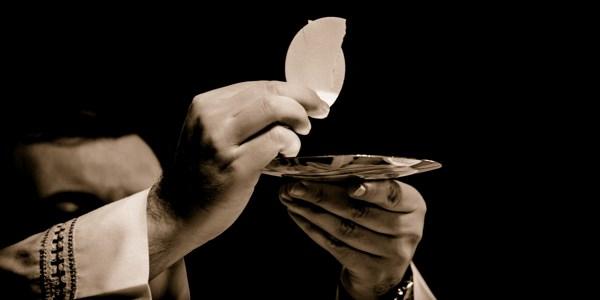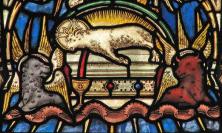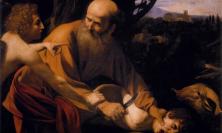
‘Adoremus’, the National Eucharistic Pilgrimage and Congress, takes place in Liverpool from 7-9 September 2018. James Hanvey SJ ponders the sacred mystery in which we participate through the simple gifts of bread and wine. It all began on that one night in an upper room in Jerusalem…
O Christ, that is what you have done for us:In a crumb of bread the whole mystery is(Patrick Kavanagh, The Great Hunger, VI)
If baptism is the great sacrament that brings us to life in Christ, the Mass or the Eucharist is the beating, living heart of the Church, from which that life is nourished, refreshed and renewed each day.
In the Manresa Jesuit Centre for Spirituality in Dublin is a collection of stained glass windows by the Irish artist Evie Hone (1894-1955). Her work in stained glass is one of the most distinguished aspects of her art. There is a fine example of it, depicting the crucifixion, in the great east window of Eton College Chapel. The windows in Manresa, which are on a much smaller scale, were taken from the chapel in the Jesuit house at Rahan, Tullamore.
They are a series of densely coloured, vivid scenes from the life of Christ and also of Mary. One shows Jesus, with the bread and the cup, gathered with his disciples at the Last Supper. To encounter the sacraments through the image and metaphor of a stained glass window is not a bad way of coming to think and reflect upon their mysteries. This is especially true of the Mass or the Eucharist. The stained glass not only arranges shape and colour to capture a particular scene, it is somehow ‘alive’ or dynamic as it mediates the light upon which it depends. We never quite see it the same way twice; depending on the light, its intensity or angle, something we hadn’t seen before, or noticed in that way before, is given to us. The play of light on the colours and forms of the glass is infinite; so too is the way we come to reflect upon the reality and the meaning of the Eucharist. Sometimes, we can see the whole in its radiance and beauty, at others we focus on a part that we see in a new or deeper way. The light not only makes the coloured glass and shapes visible, but the light itself become visible and active: ‘For with you is the fountain of life; in your light we see light’ (Psalms 36:9).
***
Christ can be present with us in so many ways: in his living, spirit-filled word, which comes to us in Old and New Testaments; in the daily rhythm of our prayer, spoken or just gathered and offered in silence. We can find Christ present with us in those moments when we need him, or when we least expect him to be there; when we catch a glimpse of him in the loving, un-self-conscious work of someone, or hear him speaking to us in words that someone offers us. Christ can be present in all these ways, but there is a sense in which they are all part of and reflections of the Eucharistic moment, when we know he is uniquely and truly present to us: to his community, the Church; and to the whole world, whatever its needs or condition.
Each day in the Mass, Christ gives us the gift of himself – all of himself. Whether the Mass is the ordinary daily parish Mass, without much ceremony, just quietly said and prayed, or it comes in the splendour of chant or polyphony, ancient languages or modern ones, it is the same gift, the same Eucharist. In whatever form, place, age or tongue, at the heart of the Mass there is an eternal simplicity: the words that Christ used on the night when he gave the Church this inestimable gift, the sacrament of himself. In words and actions, his words and actions, he concentrates the whole mystery of his person, divine and human, in giving himself to us. He asks nothing of us other than to receive him in gratitude and in faith.
When Christ gives himself, it is not a temporary or passing act, nor is it just a form of words put to an act of offering a wine-filled cup or broken bread. It is an eternal act sealed in the reality of history by the sacrifice and suffering of the cross. It gathers the whole of time – past, present and future; it gathers the whole of the community of God’s people in every age. And especially it gathers those who suffer and have suffered, the downtrodden, oppressed, used, exploited and forgotten: everyone who has lived the violence of powerlessness and these multiple poverties. Each day, in the crucified Christ, the suffering meet us and summon the world to see them, to answer their cry. In the Eucharist is the hope of every victim that their life and their pain, whatever they have lost or sacrificed, has not been in vain. God is faithful. Christ will heal their wounds with the balm of his loving justice.
The Mass exposes the illusions of earthly power, the emptiness of the world’s empires, whatever their form. In the simple celebration of the Eucharist, Christ is present and shows how he is Lord of time, space and matter. He is present not because we command him or control him. He is present not because of us, but because he chooses to be present with us and for us. If he is present as the true minister of all the sacraments, in the Eucharist he is not only the minister but is himself the gift, and for this reason the Eucharist is the sublime summit of the whole of the Church’s sacramental life.
And it all began on that one night in an upper room in Jerusalem. The Eucharist may open up the whole eternity of heaven and the Trinitarian life of God, but it always remains planted in the earth of history, the person of Jesus Christ, and this particular moment in time: it is grounded in reality even as it transforms it. The three synoptic gospels, Matthew, Mark and Luke, record it, and the earliest record of it is in Paul’s First Letter to the Corinthians. In the latter, we see how Christ’s Eucharistic gift was already central in the Church’s life. Although John’s Gospel does not follow the others in setting the Eucharist within the context of the Passover, it nevertheless contains the most profound teaching about its meaning as a real participation in Christ and his gift of life: ‘Those who eat my flesh and drink my blood have eternal life’ (John 6:54).
This moment in the upper room is a unique moment. More than anything else that he has done before, this is the moment in which Jesus brings his person, his mission and the whole salvation history of Israel into convergence. It is a moment totally saturated with God and God’s loving action of liberation and salvation. The setting was a Passover meal, for which every Jewish family would be gathered to celebrate the sovereignty of God as the protector and liberator of God’s people from Egyptian slavery. By celebrating this great act every year, Israel was not just remembering something in the past, it was making it present and renewing it as a future hope. In the Passover meal, Israel remembered its own identity and vocation to the nations, to be God’s chosen people and to make God’s name known to all peoples. It knew that God acted in history; it knew that God’s love was never abstract, never just an ideal or a dream: God’s love became a liberating, graced act in history, guiding Israel to the purpose God had ordained.
It is not an accident, then, that Jesus chooses this moment in the upper room, as part of the ancient liturgy of the Passover blessings and meal, to institute the Eucharist. He takes up all the experience and meaning of the Passover – for God’s salvation history is not divided or disjointed – and now he fulfils it in his own person. The promise of the name of Jesus, his mission and identity, is fulfilled: ‘God with us’.
There never was a time when Jesus was without the Holy Spirit, and it is the same Spirit that always acts in the Church’s celebration of the Mass, not just to recall or remember but open up for us the ‘now’ of Christ present, in the gift of his body and of his blood. It is the Holy Spirit, active and alive in us, which claims us and seals us for Christ, moves us to receive him, and opens the eyes of our mind and the understanding of our heart to recognise him as the Lord in the breaking of the bread and the drinking of the cup. It is the Spirit that gives us the courage to accept the gift, even though we know that we are not worthy and never could be worthy.
In that moment the disciples and all those gathered in the upper room must have felt so deeply loved. It was something they knew they could never forget for it was the moment that interpreted all that was to follow for Jesus and for them. They must have known then and come to see more deeply later that Christ had instituted a new reality in the sacrament of his body and blood that was not separate from the gospel they would preach and the witness they would give. They must have experienced the intense sense of completeness with all who shared this meal and this moment. It is not just a common memory and performance of words and deeds – that is one sort of sharing and sense of common bond, a memorial. This was more than that. Christ was not remembered, he was – he is – present. The disciples now lived his life. As Paul was later to see, they had become his body; more than a metaphor, now a sacramental reality.
Here is the great wonder: Christ uses everyday things and raises them into something sacred and holy. He does this respecting their very ordinariness: the bread remains our daily bread and the wine our daily drink. These simple created gifts, the work of our hands, become the means where we find him and meet him. Forever, so long as time and matter last, we will always be able to encounter him and make our home in him. Here, too, we will learn his way of healing love: in the small but infinitely powerful and transforming acts of self-gift, the sacrifices that reason can never fully understand but make the daily sacrament of love, our lives in him are becoming the Eucharist. In him we meet each other anew and start over again. Like the disciples, our lives become always a return to and sending forth from this sacrament, ‘Through him and with him and in him, O God, almighty Father, in the unity of the Holy Spirit, all glory and honour is yours, for ever and ever. Amen.’
James Hanvey SJ is Master of Campion Hall, University of Oxford.





